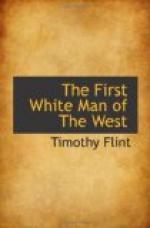In the meantime, while Boone had been thus courting solitude, and absorbed by the engrossing excitement of hunting, the restless spirit of immigration, and of civil and physical improvement, had not been idle. After the peace the tide of population poured into the country in a continual stream and the busy spirit of civilization was every where making inroads into the ancient forests, and encroaching upon the dominions of the hunter.
In order, however, that the reader may more readily comprehend the causes which operated as grievances to Boone, and finally led him to abandon Kentucky, and seek a home in regions more congenial, it will be necessary to allude to the progress made in population, and the civil polity, and incidents attending the settlement of the country.
The state of Kentucky was not surveyed by the government and laid off into sections and townships as has been the case with all the lands north of the Ohio. But the government of Virginia had issued land warrants, or certificates entitling the holder to locate wherever he might choose, the number of acres named in the warrant. They also grave to actual settlers certain pre-emption rights to such lands as they might occupy and improve by building a cabin, raising a crop, &c. The holders of these warrants, after selecting the land which they intended to cover, with their titles, were required to enter a survey and description of the tracts selected, in the Land office, which had been opened for the purpose, to be recorded there, for the information of others, and to prevent subsequent holders of warrants from locating the same lands. Yet notwithstanding these precautions, such was the careless manner in which these surveys were made, that many illiterate persons, ignorant of the forms of law, and the necessity of precision in the specification and descriptions of the tracts on which they had laid their warrants, made such loose and vague entries in the land office, as to afford no accurate information to subsequent locators, who frequently laid their warrants on the same tracts. It thus happened that the whole or a part of almost every tract was covered with different and conflicting titles—forming what have been aptly called ’shingle titles’—overlaying and lapping upon each other, as shingles do upon the roof of a building. In this way twice the existing acres of land were sold and the door opened for endless controversy about boundaries and titles. The following copy of an entry may serve as a specimen of the vagueness of the lines, buts, and bounds of their claims, and as accounting for the flood of litigation that ensued.
“George Smith enters nine hundred acres of land on a treasury warrant, lying on the north side of Kentucky river, a mile below a creek; beginning about twenty poles below a lick; and running down the river westwardly, and northwestwardly for quantity.”




